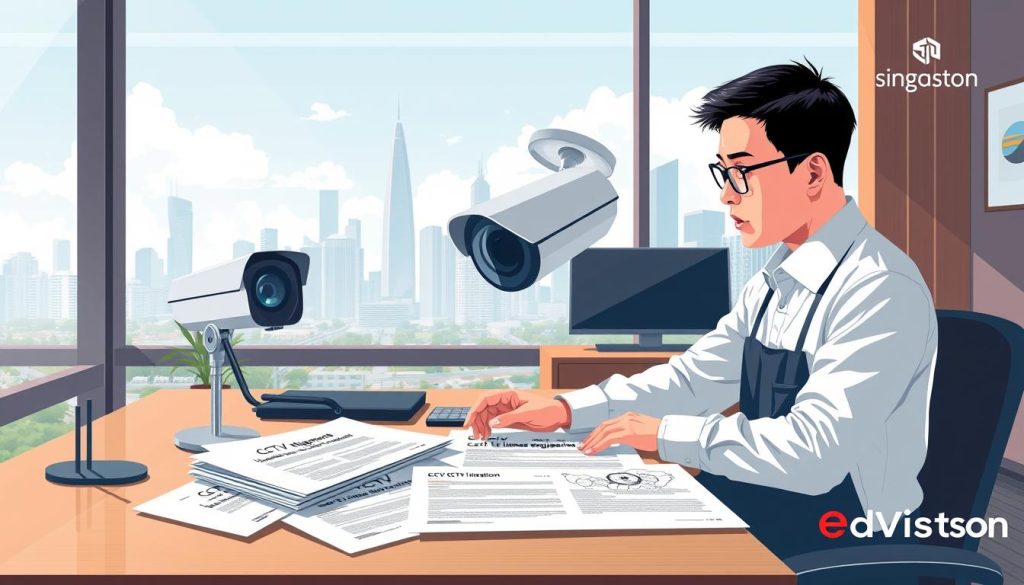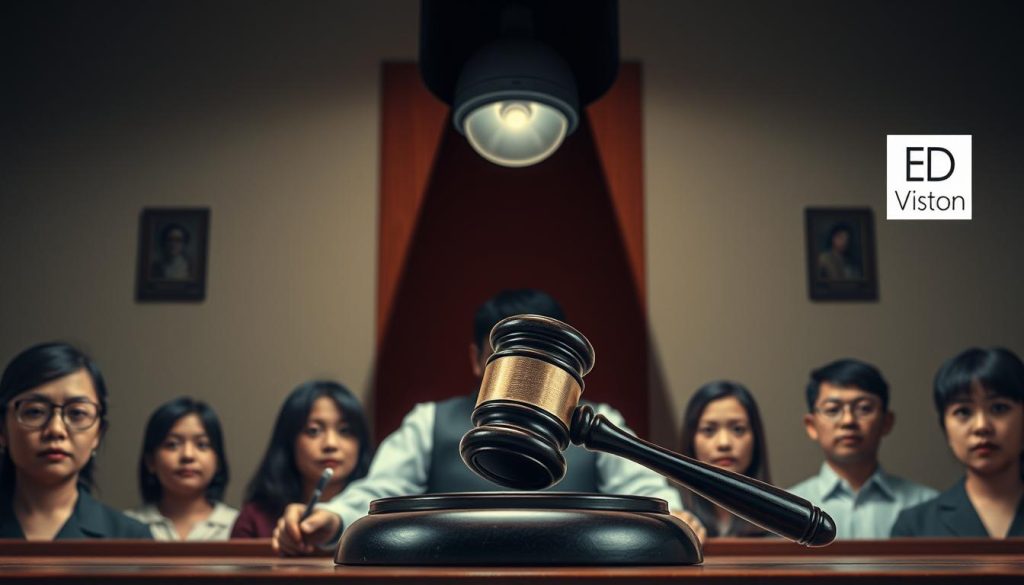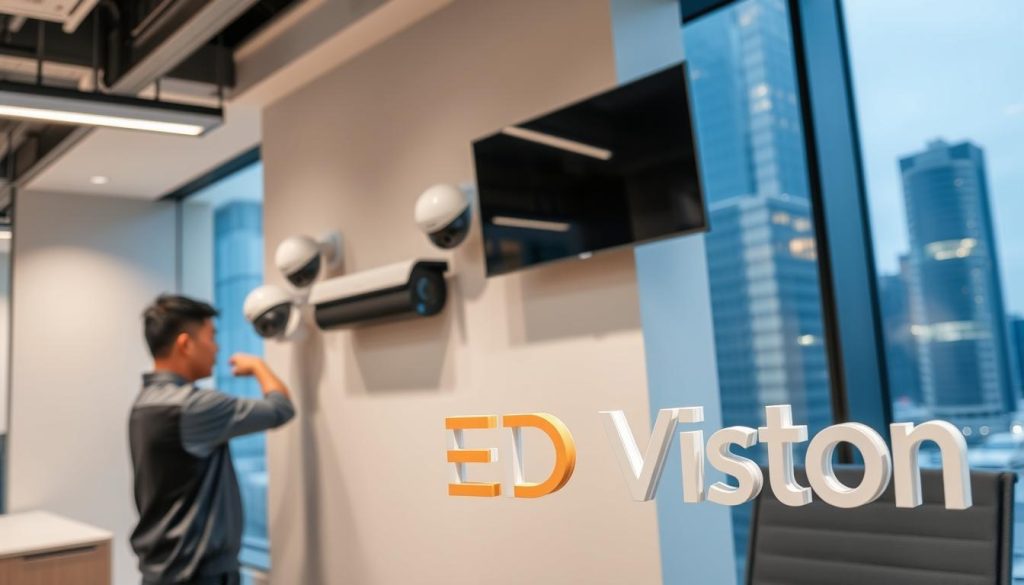Ever thought about needing a CCTV licence for your home or business in Singapore? Many people use CCTV systems for security, but they worry about the law. We’ll look into if you really need a CCTV licence in Singapore.
In Singapore, the law on CCTV Licence in Singapore is clear. Homeowners can use cameras inside their homes without a licence. But, HDB rules say no to cameras in common areas. Putting cameras outside without permission can cost up to $5,000.
Installing CCTV systems needs careful planning. You should know the rules and get advice. Wondering if you need a CCTV Licence? It depends on your plans. For more info and the latest security tech, contact ED Viston today at +65 8313.
Key Takeaways
- CCTV installation inside homes does not require a licence.
- HDB regulations prohibit CCTV cameras in common areas.
- Fines up to $5,000 can be incurred for unauthorized outdoor installations.
- Public area monitoring necessitates special permits.
- Always verify whether permission is needed before installation.
Understanding CCTV and Its Importance
CCTV systems are key to keeping people and places safe in Singapore. They are used everywhere, showing how important they are. With almost a million cameras, they help protect both people and property.
Role of CCTV in Residential Security
CCTV cameras give homeowners peace of mind. They help families watch over their kids and homes. They also scare off intruders and provide proof if something happens.
In places like HDB flats, CCTV helps fight harassment and loan shark problems. Residents need permission to install them.
Benefits of CCTV for Businesses
Businesses get more than just security from CCTV. They help prevent theft and damage, making places safer for everyone. Laws guide how businesses use CCTV, keeping things secure and private.
Installing CCTV is a smart move for homes and businesses. For more info on CCTV solutions, call ED Viston at +65 8313 4578.
CCTV Licensing Laws in Singapore
CCTV licensing laws in Singapore are key to using surveillance technology responsibly. It’s important for everyone to know these laws. Following these rules helps protect privacy and improve security for all.
Overview of CCTV Surveillance Regulations
In Singapore, CCTV camera rules differ by location. People living in HDB flats need permission for cameras in shared areas. But, cameras in private spaces usually don’t need a permit.
Recently, rules for corridor cameras have been made easier. For businesses, CCTV for monitoring doesn’t need a permit. But, telling employees about cameras is a must. Cameras facing public or private areas need a permit to respect privacy.
Who Regulates CCTV Installations?
Several groups watch over CCTV rules. The Urban Redevelopment Authority (URA) and the Housing & Development Board (HDB) check if people follow the rules. They look at permit applications and handle rule-breaking.
It’s important to learn about these rules. Breaking them can lead to fines or even jail time.
People and businesses should talk to experts to keep up with CCTV rules. For the latest on CCTV solutions and deals, call ED Viston at +65 8313 4578 today.
Do I Need a CCTV Licence?
Figuring out if you need a CCTV licence in Singapore depends on certain situations requiring CCTV Licence. Homeowners can now install CCTV cameras in their homes without needing approval from the Housing & Development Board (HDB). But, it’s important to make sure these cameras don’t spy on your neighbors’ homes.
Situations That Require a Licence
Most homeowners don’t need a licence for CCTV in their flats. You can also use smart doorbells and viewers without needing approval. But, if you plan to offer CCTV installation services, you’ll need a Security Service Provider (SSP) licence. CCTV footage is also key in solving crimes, helping with investigations.
Common Misconceptions
Many people think wrongly about needing a licence for CCTV. They might believe installing a camera needs a licence or that they can watch public areas without limits. The truth is clear. You can put cameras on your property, but you must follow privacy rules. These cameras are meant to enhance security, not invade others’ privacy.
For more details on CCTV solutions and deals, call ED Viston today at +65 8313 4578.
CCTV License Requirements
Knowing what you need for a CCTV license is key in Singapore. Both homeowners and businesses must understand the CCTV License requirements. This ensures monitoring is done right and privacy laws are followed.
Eligibility Criteria for Obtaining a License
To get a CCTV License, you must meet certain rules. You need a good reason for installing cameras, like improving security or watching public areas. It’s important to not spy on neighbors or break laws.
Here are some key things you need:
- Valid identification to confirm identity.
- A detailed purpose statement outlining the intent behind the installation.
- Compliance with local safety regulations to avoid possible dangers.
Key Documentation Needed
When applying, you’ll need key documentation for CCTV License. You should have:
| Document | Description |
|---|---|
| Identification | Proof of identity, like a National Registration Identity Card (NRIC) or passport. |
| Purpose Statement | A written statement explaining why you’re installing CCTV cameras. |
| Compliance Confirmation | Proof you follow privacy and safety rules, making sure you don’t break them. |
| Police Report | Needed for cameras outside homes, to show why you need them. |
Having all your documents ready makes applying easier. If you’re interested, call ED Viston today at +65 8313 4578. They can tell you more about CCTV solutions and deals.

How to Obtain a CCTV License
Getting a CCTV license in Singapore is a straightforward process. Knowing the CCTV License application process makes it easier. Follow these steps to ensure you meet all requirements and get your license.
Step-by-Step Application Process
To apply for a CCTV License, just follow these steps:
- First, check if you need a license based on your property and its use.
- Next, collect all needed documents like ID, proof of address, and a CCTV plan.
- Then, fill out the application forms at your local authority, like the HDB for homes.
- After that, send in your application and documents to the right body.
- Next, pay any fees for the license application.
- Wait a few weeks for a review. Keep an eye out for any extra info needed.
- Once approved, you’ll get your license. Make sure you understand the rules and follow them.
Where to Apply for a License
Where you apply depends on your situation:
| Use Case | Regulatory Body |
|---|---|
| Residential Properties | Housing & Development Board (HDB) |
| Commercial Installations | Security Industry Authority (SIA) |
| Public Spaces | Local Government Authorities |
Understanding how to get a CCTV License and what steps to take keeps you in line with the law. Contact ED Viston today at +65 8313 4578 to learn about the latest CCTV options and deals!
CCTV License Fees
It’s important for homeowners and businesses to know about CCTV License fees. These costs can change a lot based on the installation needs and the property type. Homeowners and businesses have different financial situations, affecting how they handle CCTV system installations.
Cost Implications for Homeowners vs. Businesses
Homeowners usually pay less for a CCTV license for homes. The price depends on the number of cameras and how complex the setup is. Businesses, with bigger installations, face higher costs for licenses and setup. Several factors can affect the cost of a CCTV License:
- Type and number of cameras
- Required maintenance and upgrades
- Need for ongoing monitoring services
Businesses also need licenses for more operators, which adds to the cost. Knowing these factors helps with budgeting and avoiding surprise expenses.
Possible Hidden Charges
When getting a CCTV License, hidden costs can pop up. These might include:
- Extra permits or local rules for setup
- Service fees that aren’t the usual rate
- Signage costs to show CCTV presence
Being clear about costs is key to avoid surprises. Looking at different vendors and services helps understand all costs in the CCTV licensing process. It’s smart to talk to experts who know local rules to avoid extra charges.
For more info on CCTV solutions and deals, call ED Viston today at +65 8313 4578.
CCTV License Exemptions
CCTV License exemptions let people and groups put up surveillance cameras without a license in some cases. Knowing when you don’t need a license can make things easier, like for homeowners wanting to keep their homes safe. The rules are clear about who gets these exemptions, showing when you can use cameras without a license.
Understanding Exempt Situations
New rules have made it simpler for homeowners to put up CCTV cameras in HDB flats. These CCTV License exemptions help people fight theft and other crimes. For example, a CCTV camera helped catch a thief who stole shoes.
Who Benefits from Exemptions?
Homeowners benefit the most from these exemptions, mainly to prevent theft or harassment. Experts say it’s key to install high-quality cameras in the right spots. This way, you can watch over your place well and follow the rules.
For more info on CCTV solutions and deals, call ED Viston at +65 8313 4578.
Legal Implications of Non-Compliance
Installing CCTV systems must follow strict rules. Not following these rules can lead to big legal problems. It’s important for everyone to know the legal issues of not following these rules.
Breaking the law can mean big fines and even legal suits from those affected.
Potential Consequences for Illegal Installations
The penalties for setting up CCTV without permission are serious. People might face:
- Substantial fines from the authorities.
- Having to take down the systems, which costs more.
- Legal trouble from those whose privacy was broken.
- More checks from agencies in the future.
Privacy is a big deal here. Not following the rules can harm not just the person or company but also others. It can make people lose trust in them.
It’s not just about the fines. It can also hurt their reputation for a long time.

Knowing the risks of using CCTV without permission is key. It shows why it’s important to use them responsibly and follow the laws. If you’re unsure, getting advice from experts can help.
Call ED Viston today at +65 8313 4578 to learn more about CCTV solutions and deals.
Conclusion
Knowing about the CCTV License in Singapore is key for both homeowners and business owners. The world of security is always changing. So, it’s vital to keep up with the summary of CCTV regulations to follow the law.
Homeowners can put up surveillance systems on their own property without a license. This makes it easier to boost security. But, putting cameras in public places needs permits to avoid misuse and protect privacy.
Businesses must follow the Personal Data Protection Act (PDPA). This means telling people when their data is collected by CCTV. Also, getting permission from local councils is needed for installing cameras in places like HDB apartments. This shows how important local rules are.
Installing CCTV systems can bring many benefits, like making operations more efficient. This is because you don’t always need to watch the cameras yourself. But, businesses must be careful. Installing cameras without permission can lead to big fines and legal problems.
If you want to learn more about your security needs or improve your setup, contact Wenhong’s experts. They offer custom CCTV solutions for different needs in Singapore.
For advice on the latest CCTV solutions and deals, call ED Viston at +65 8313 4578. They can help you find the best options.
Contact Us for More Information
Thinking about boosting your security with CCTV systems? It’s smart to talk to the pros. They can offer solutions that fit your specific needs. If you want to keep your property safe, contact for CCTV solutions today. First Solution Group, with over 500,000 installations in Singapore, is your go-to for reliable service.
Knowing the law about CCTV is key. You don’t need HDB approval for cameras facing corridors anymore. But, the Town Council can fine you up to $5,000 for unauthorized cameras outside HDBs. Stay up to date with these rules to keep your security and follow the law.
Professional CCTV installation in Singapore comes with many benefits. You get cameras that can be placed just right, high-quality images, and the ability to watch live feeds from anywhere. Plus, you get expert installation at good prices. This means you get the latest tech and follow all local rules, giving you peace of mind.
Need help with legal stuff, how to install, or the newest tech? Don’t wait. Call ED Viston at +65 8313 4578 to learn more about CCTV solutions and special deals. Get the right CCTV system to protect your home or business.
Resources for Further Reading
For those interested in learning more about CCTV rules and best practices, many resources are available. Government websites have detailed guides on legal aspects, like licensing and privacy laws. Knowing these can help you make smart choices about CCTV in Singapore.
Legal texts on surveillance and privacy help readers understand CCTV’s impact. Security experts’ articles offer practical tips on the benefits and risks of these systems. They cover data privacy and hacking risks. This information is very useful for anyone thinking about installing CCTV.
If you’re looking for the latest in CCTV solutions and deals, contact ED Viston at +65 8313 4578. Our team is here to help you with CCTV installations and ensure you follow all rules.
FAQ
Do I need a CCTV licence for my home in Singapore?
What are the key CCTV licence requirements?
What is the process to apply for a CCTV licence?
Are there any fees associated with obtaining a CCTV licence?
Who regulates CCTV installations in Singapore?
Can I install CCTV in public spaces without a license?
What are the exemptions from needing a CCTV licence?
What are the legal consequences of not having a CCTV licence?
Source Links
- https://www.firstsolution.com.sg/blog/how-to-legally-install-cctvs-in-singapore/
- https://www.cctvsg.net/do-we-need-a-permit-to-install-a-cctv-in-singapore/
- https://web.securitysystem.com.sg/cctv-law-singapore/
- https://network-data-cabling.co.uk/blog/what-is-cctv/
- https://www.cctv-camera.com.sg/articles/do-we-need-permit-to-install-cctv-in-singapore.html
- https://www.privacy.com.sg/resources/cctv-law-singapore/
- https://www.police.gov.sg/-/media/Spf/Images/Licences-Documents/CCTV-7A.ashx
- https://sgcctv.com.sg/cctv-camera-laws-in-singapore/?srsltid=AfmBOooI6KaxsqPfYE3QhhSNSRxcptn4WRPJIyiGFkYfG6iVQHbf0E5A
- https://www.police.gov.sg/e-Services/Police-Licences/Security-Service-Provider-Licence
- https://sgcctv.com.sg/cctv-camera-laws-in-singapore/?srsltid=AfmBOor4N4UgcHmpOuyOdZwyaGHNQjnFI55YY3q_HBjUfGwIhTlsTomv
- https://web.securitysystem.com.sg/cctv-camera-for-hdb-flat/
- https://www.linkedin.com/pulse/do-you-need-licence-cctv-protive-security-surveillance-li-n1sne
- https://sgcctv.com.sg/cctv-camera-laws-in-singapore/?srsltid=AfmBOoqMLHxrKfoEmLKBy7O7DQrueCEJniJ183tvLoBKF3IBQPK4gD1O
- https://sgcctv.com.sg/cctv-camera-laws-in-singapore/?srsltid=AfmBOootUbqmSxyxRMHo5jQzNuO_wEFOKQ6xDMDjYEwgrtBEnZeT0V0i
- https://www.get-licensed.co.uk/licence/cctv-licence
- https://sgcctv.com.sg/cctv-camera-laws-in-singapore/?srsltid=AfmBOoqMGsWzqC6bzMQGpFfDaZik0Gx7bLfPY2UAbgz7mreqQ_zi4ZgD
- https://ambatraining.com/do-cctv-operators-need-a-sia-licence/
- https://www.caughtoncamera.net/news/cctv-legal-requirements-cctv-laws-explained/
- https://www.progress.com/blogs/cctv-is-a-data-compliance-issue
- https://nfg.ie/legal-implications-of-cctv-in-the-workplace/
- https://ktree.com.sg/industry/security-cctv-cameras-privacy-invasion/
- https://www.lyonspc.com/2022/03/05/installation-cctv-security-systems-state-license/
- https://sgcctv.com.sg/cctv-camera-laws-in-singapore/?srsltid=AfmBOorns6b8Xb9y3i4FNwConh3uRe_S5CE4NSZoUDegXnjUzhFJoys5
- https://www.straitstimes.com/singapore/hdb-approval-no-longer-needed-for-corridor-facing-cctvs-in-flats-demand-for-devices-on-the-rise
- https://www.gov.uk/government/publications/domestic-cctv-using-cctv-systems-on-your-property/domestic-cctv-using-cctv-systems-on-your-property
- https://ico.org.uk/for-organisations/uk-gdpr-guidance-and-resources/cctv-and-video-surveillance/guidance-on-video-surveillance-including-cctv/additional-considerations-for-technologies-other-than-cctv/?q=best practice

